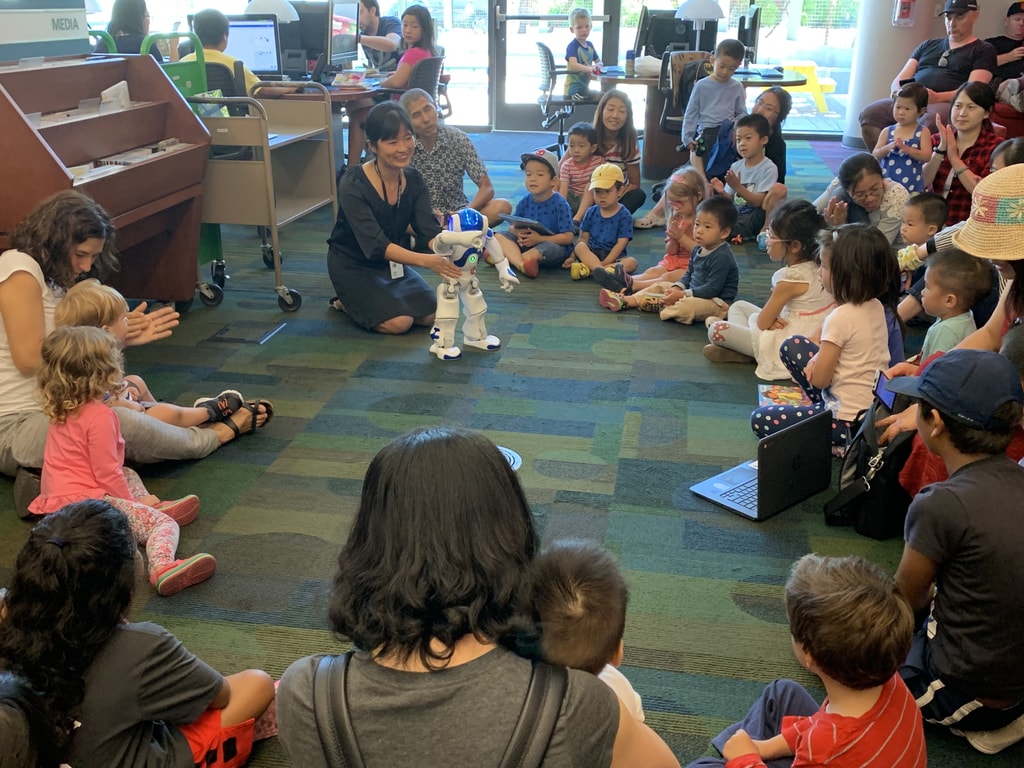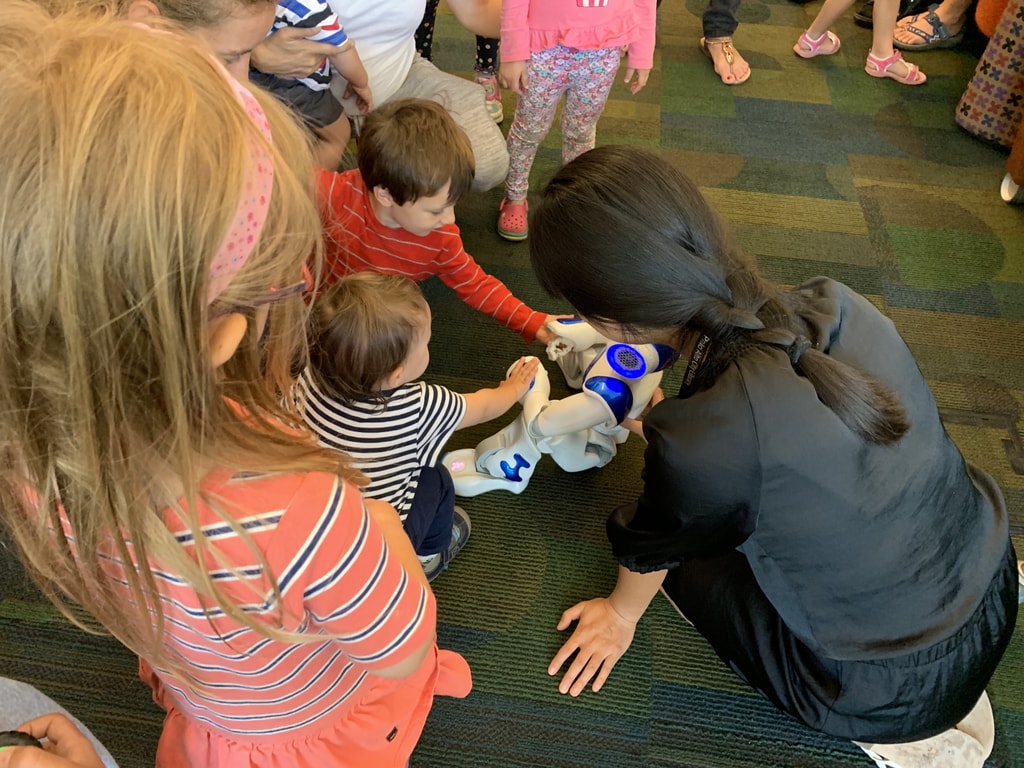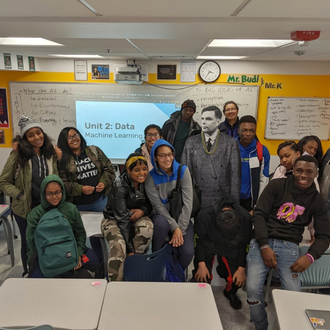Lessons from the "Robo Dojo Master": Robotics and AI in Libraries
by Dan Lou, Senior Librarian, Palo Alto City Library
On a typical Sunday, a lot of light-hearted laughs fill the Kids Area in the Mitchell Park branch at Palo Alto City Library. Dewey, the humanoid NAO robot, is taking people's breath away by doing his tricks. In the half-hour-long program, we usually ask Dewey to perform a series of tasks by using voice commands. These tasks range from smart conversation to physical activities. People often take out their phones to record Dewey, especially when kids start to tickle the robot and he giggles and wiggles in a way that is both robotic and humanized. Dewey is without a doubt the superstar at such events and he earned his title "Dewey Sensei" at the library a long time ago. He is not only a "Stage Show Performer," but also a "Robo Dojo Master" and "Storytime Specialist."
The library started the robotics project after receiving the Innovation and Technology Grant from Pacific Library Partnerships. During the last two years, the library has successfully developed Dewey into an intelligent robot that possesses a few smart features similar to Siri, Alexa and Google Home. In fact, at the 2018 Internet Librarian conference, Dewey shared the stage with these smart devices in a competition to see who was the smartest. Through fun activities and discussions, librarians were able to better grasp how artificial intelligence works and whether it will impose threats to our profession. The same questions bother a much broader audience. How will disruptive technologies like AI empowered robots unfold in today’s society? What are the implications? What kind of influence do ordinary people like you and me have on the development of such technologies? Regardless of the nature and agenda of these technologies, it makes sense to first arm ourselves with a better understanding of how they work.

The goal of our robotics project is to help the community understand cutting-edge robotics technologies and better prepare for an unknown future. The library is also trying to lead robotics and AI education at libraries, which should be considered an integral part of digital literacy. We are thrilled that the California State Library acknowledged our vision by accepting the robot coding program Robo Dojo (previously Coding with the Robot) as a highlighted LSTA copycat grant last year, which will be continued this year. We developed a set of complementary programs to ensure that the robotics project can grow organically and reach the whole community with full impact.
On the development side, we want to continue to solicit the community's contribution. Anyone age 11 and older is welcome to develop single-purpose applications for Dewey at the Robo Dojo workshops. In the three-hour workshop, absolute beginners learn the basics by following step-by-step instructions to develop several example applications. The workshop soon developed into a popular mixed-age group coding event at the library which is always fully registered. Attendees learn how some far-fetched technologies actually function on this specific robot, such as speech recognition, natural language processing (NLP), face recognition and obstacle detection. Then, attendees have 90 minutes to try their hand at developing their own applications for Dewey.

We have hosted 23 Robo Dojo workshops with a total of 430 attendees so far. We appreciated these heartfelt comments from our attendees:
My son attended the workshop with his two friends and he thoroughly enjoyed it. I think I should take the class as well.
Thank you. You made it look very easy to do. I urged my daughter to submit the final application and it's working! I am now asking her help to get mine working.
Even better than the comments are the inspiring applications developed by attendees at the workshops. They demonstrate how complete a picture can be drawn when everyday people experience high-tech. For example, a family taught Dewey to do the trendy Dab dance, "a dance craze that is spreading through professional sports across the globe" per the Telegraph report. A senior couple made Dewey recite poems for the very first time. A teen trained Dewey to answer community-specific questions.
Bit by bit, such applications get integrated into the master application we developed, the brain of Dewey, to make him more capable. At the back end, we have worked to improve Dewey's speech recognition, NLP and responses by trying out AI empowered tools like DialogFlow and Wit.ai in combination with knowledge bases like a sandbox catalog API, WikiData and Wolfram|Apha.
These development efforts go hand in hand with the robotics experience programs, including the Sunday Robot Show, Storytime, book club events and outreach events. Dewey won't be able to impress people at these events without the development efforts from the community. This year from January to August, we hosted 17 Sunday Robot Shows with 597 attendees enjoying Dewey's performances. These experience programs also provide guidance for our development effort. Recently at a Sunday Robot Show, I got asked by a little one if the robot "could floss." I spent a few minutes to learn the floss dance that afternoon, and we are now in the process of teaching Dewey to floss too.
But not all of our experiences with Dewey are pleasant. Dewey is aging fast, and soon he will become an antique. Technologies seem to have the lifespan of a fly. Libraries are playing a dangerous catch-up game here. We have to be better prepared when entering the treacherous water called emerging technologies. We need good insights and visions, sustainable grant and budget plans and carefully carved out contract terms as well as flexible project management on the ground level to repurpose "outdated" technologies.
The current grant and budget plans in libraries are not sustainable for new technology projects. For an AI project, we need suitable budget to cover the long-term subscription cost for cloud servers, cloud storage, cloud computing, API calls and the cost of hardware upgrades. This is very hard to achieve with the current system.
In developing Dewey, we learned that AI in libraries is an unchartered map. We now know that we have to be creative in managing new technology projects. Our hard work with Dewey, a soon-to-be "antique," could go in vain without a plan B. Last year, we began to generalize some of the solutions we had for Dewey. Palo Alto City Library, along with Roanoke County Library, is working on a prototype chatbot platform. The hope here is that this chatbot will become as platform-neutral as possible and can be extended to future hardware.
Dan Lou is a senior librarian at Palo Alto City Library, where she works on web content management and develops pioneering programs on robot, coding, AR content creation and distributed web.

Want to learn more about library
leadership in the AI age?
This October 16-18, the 2019 ULC Forum: Preparing to Lead on AI + Digital Citizenship will convene our member community in Salt Lake City to engage in expert-led discussions and activities to elevate our shared understanding of the economic and social implications of emerging technologies.
Hosted by Salt Lake City Library and Salt Lake County Library, this important event will bring together leaders from major urban library systems across the U.S. and Canada. Together, we will map out how libraries can take ownership of their role at the forefront of the AI revolution, fostering and empowering digital-savvy citizens with services and tools that will strengthen democracy.
Related Articles

Changing the Face of AI Through Youth Education
AI4ALL
Learn how community-centered learning can be central to a vision of building the next generation of AI leaders.
Learn More

AI & Pandora: Restraining Evil, Liberating Hope
Roanoke County Public Library
Discover how Roanoke County Public Library was embracing artificial intelligence prior to the pandemic, and how the library quickly pivoted during closure to transfer programming online.
